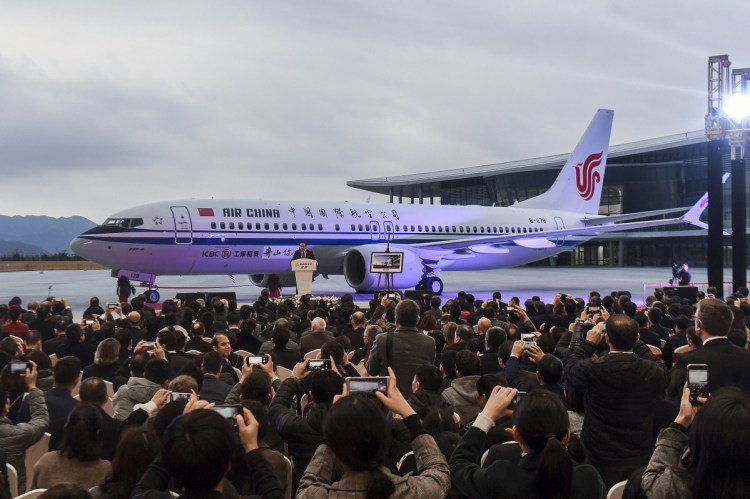BEIJING — Boeing’s stock plunged Monday as the list of countries and airlines grounding the Boeing 737 Max 8 planes continued to grow the day after one crashed in Ethiopia, killing all 157 people on board.
The Ethiopian Airlines jet crashed shortly after it took off from Addis Ababa on Sunday, drawing renewed scrutiny of the plane just four months after a similar crash of the same model killed 189 people in Indonesia.
Authorities in China, Indonesia and Ethiopia ordered airlines to ground their Boeing 737 Max 8 planes Monday. Chicago-based Boeing said it did not intend to issue any new guidance to its customers. It does plan to send a technical team to the crash site to help Ethiopian and U.S. investigators.
The 737 is the best-selling airliner in history, and the Max, the newest version of it with more fuel-efficient engines, is a central part of Boeing’s strategy to compete with European rival Airbus.
“Safety is our number one priority and we are taking every measure to fully understand all aspects of this accident, working closely with the investigating team and all regulatory authorities involved,” the company said in a statement.
Boeing’s stock slumped. On Monday, shares slid more than 13 percent to $365.55 shortly after the market opened. However, shares pared losses and closed lower by 5.36 percent. It was the only stock in the Dow to close with a loss.
A spokesman for Ethiopian Airlines, Asrat Begashaw, said the carrier had grounded its remaining four 737 Max 8 planes until further notice as an “extra safety precaution.”
The airline had been using five new 737 Max 8s and awaiting delivery of 25 more. Asrat said the search for body parts and debris from the crash was continuing.
China’s Civil Aviation Administration said that it ordered airlines to ground all 737 Max 8 aircraft, in line with the principle of “zero tolerance for security risks.”
It said it would issue further notices after consulting with the Federal Aviation Administration and Boeing.
FAA spokesman Lynn Lunsford would not say whether the agency plans to ground any planes.
“Each action taken by the FAA is based on sound, proven facts,” he said in a statement.
“If we have information that affects safety, we take immediate and appropriate action,” the statement said.
The FAA on Sunday said it is in contact with the State Department and plans to join the National Transportation Safety Board in helping Ethiopian civil aviation authorities investigate the crash.
Chinese carriers and leasing companies operate 96 Boeing 737 8 MAXs, according to the government, with dozens more believed to be on order. China Southern Airlines is one of Boeing’s biggest customers for the aircraft.
Indonesia also grounded 11 737 Max 8s for inspections to ensure flight safety and that the planes are airworthy, said Director General of Air Transportation Polana B. Pramesti.
Cayman Airways also said it was temporarily grounding two Boeing 737 Max 8 aircraft along with Comair, the operator of British Airways and Kulula flights in South Africa.
Wrenelle Stander, executive director of Comair’s airline division, said in a statement that Comair “remains confident in the inherent safety of the aircraft.”
It’s unusual for authorities to take the step of grounding planes, and it’s up to each country to set standards on which planes can fly and how those planes are maintained, said Todd Curtis, an aviation safety analyst who directs the Airsafe.com Foundation.
“If there is a suspicion … that there’s not only something inherently wrong with 737 Max 8 aircraft, but there are no procedures in place to cure the problem, then yes, they should either ground the plane, or there are several levels of things they could do,” Curtis said.
For example, authorities could require that airlines check certain planes do not have a specific problem before they could fly, or they could require replacing parts or systems before the next flight, Curtis said. The FAA frequently directs airlines to ensure certain corrections are made within a specific timeframe, he said.
The FAA told airlines in November to update the plane’s operating manual with information about the 737 Max 8’s system that can automatically turn the plane’s nose down, and inform pilots how to respond if the system kicks in.
The head of Indonesia’s national transport safety agency, Soerjanto Thahjono, offered to aid the Ethiopian investigation into Sunday’s crash.
The NTSB likewise said it was sending a team to help Ethiopian authorities. Boeing and the U.S. investigative agency are also involved in the probe into the Lion Air crash in Indonesia in October.
Send questions/comments to the editors.


